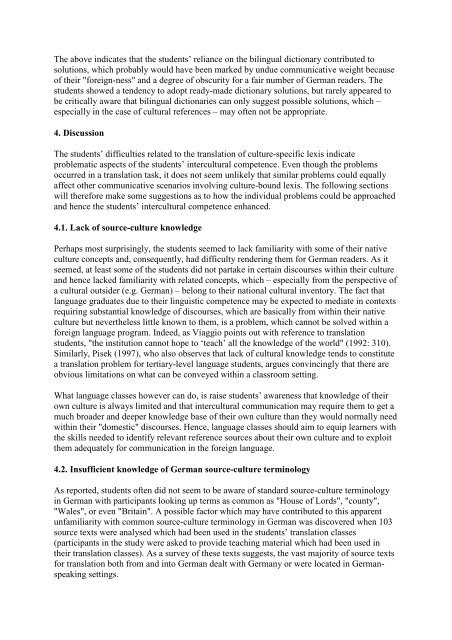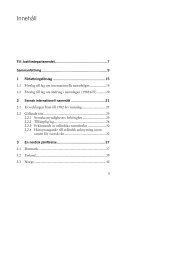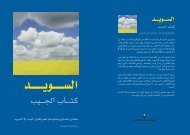Translation, Cultural Knowledge and Intercultural Competence
Translation, Cultural Knowledge and Intercultural Competence
Translation, Cultural Knowledge and Intercultural Competence
You also want an ePaper? Increase the reach of your titles
YUMPU automatically turns print PDFs into web optimized ePapers that Google loves.
The above indicates that the students’ reliance on the bilingual dictionary contributed tosolutions, which probably would have been marked by undue communicative weight becauseof their "foreign-ness" <strong>and</strong> a degree of obscurity for a fair number of German readers. Thestudents showed a tendency to adopt ready-made dictionary solutions, but rarely appeared tobe critically aware that bilingual dictionaries can only suggest possible solutions, which –especially in the case of cultural references – may often not be appropriate.4. DiscussionThe students’ difficulties related to the translation of culture-specific lexis indicateproblematic aspects of the students’ intercultural competence. Even though the problemsoccurred in a translation task, it does not seem unlikely that similar problems could equallyaffect other communicative scenarios involving culture-bound lexis. The following sectionswill therefore make some suggestions as to how the individual problems could be approached<strong>and</strong> hence the students’ intercultural competence enhanced.4.1. Lack of source-culture knowledgePerhaps most surprisingly, the students seemed to lack familiarity with some of their nativeculture concepts <strong>and</strong>, consequently, had difficulty rendering them for German readers. As itseemed, at least some of the students did not partake in certain discourses within their culture<strong>and</strong> hence lacked familiarity with related concepts, which – especially from the perspective ofa cultural outsider (e.g. German) – belong to their national cultural inventory. The fact thatlanguage graduates due to their linguistic competence may be expected to mediate in contextsrequiring substantial knowledge of discourses, which are basically from within their nativeculture but nevertheless little known to them, is a problem, which cannot be solved within aforeign language program. Indeed, as Viaggio points out with reference to translationstudents, "the institution cannot hope to ‘teach’ all the knowledge of the world" (1992: 310).Similarly, Pisek (1997), who also observes that lack of cultural knowledge tends to constitutea translation problem for tertiary-level language students, argues convincingly that there areobvious limitations on what can be conveyed within a classroom setting.What language classes however can do, is raise students’ awareness that knowledge of theirown culture is always limited <strong>and</strong> that intercultural communication may require them to get amuch broader <strong>and</strong> deeper knowledge base of their own culture than they would normally needwithin their "domestic" discourses. Hence, language classes should aim to equip learners withthe skills needed to identify relevant reference sources about their own culture <strong>and</strong> to exploitthem adequately for communication in the foreign language.4.2. Insufficient knowledge of German source-culture terminologyAs reported, students often did not seem to be aware of st<strong>and</strong>ard source-culture terminologyin German with participants looking up terms as common as "House of Lords", "county","Wales", or even "Britain". A possible factor which may have contributed to this apparentunfamiliarity with common source-culture terminology in German was discovered when 103source texts were analysed which had been used in the students’ translation classes(participants in the study were asked to provide teaching material which had been used intheir translation classes). As a survey of these texts suggests, the vast majority of source textsfor translation both from <strong>and</strong> into German dealt with Germany or were located in Germanspeakingsettings.
















